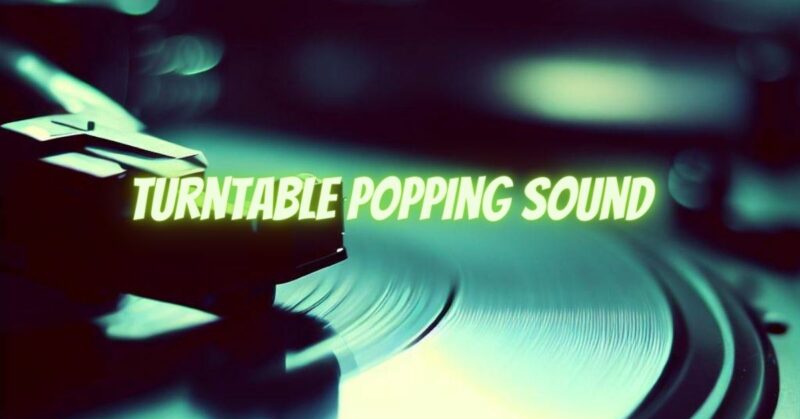Vinyl records and turntables have enjoyed a resurgence in popularity over the past few years, offering music enthusiasts a nostalgic and tactile way to enjoy their favorite tunes. However, along with the rich analog sound, there’s another characteristic that comes with vinyl playback – the occasional popping sound. This phenomenon, often mistaken for imperfections, adds a unique charm to vinyl listening. In this article, we will delve into the world of turntable popping sounds, exploring their causes, significance, and how they contribute to the vinyl experience.
Understanding Turntable Popping Sounds
Turntable popping sounds, commonly referred to as “pops” or “crackles,” are those distinct clicks and pops that can be heard during vinyl playback. They can vary in intensity, from subtle to more pronounced, and are often attributed to various factors inherent to the vinyl medium.
Causes of Turntable Popping Sounds
- Surface Imperfections: Vinyl records are susceptible to accumulating dust, dirt, and even microscopic particles over time. When the stylus (needle) traverses these imperfections, it can result in audible popping sounds. Additionally, minor scratches or scuffs on the vinyl’s surface can contribute to the issue.
- Static Electricity: Vinyl records can develop static electricity due to friction between the stylus and the surface. This static charge attracts dust and particles, making them cling to the record’s grooves. When the stylus encounters these particles, pops can occur.
- Wear and Tear: As vinyl records are played repeatedly, the grooves can wear down and accumulate debris. This wear can lead to more prominent pops, especially if the stylus encounters a deep groove or a groove with accumulated debris.
- Manufacturing Defects: During the vinyl manufacturing process, minor defects such as tiny air bubbles or impurities can become trapped in the vinyl. When the stylus encounters these defects, it can result in pops.
- Storage and Handling: Improper storage and handling of vinyl records can contribute to the development of surface imperfections. Records stored in dusty environments or handled without care are more likely to exhibit popping sounds.
Significance in the Vinyl Experience
While some might perceive turntable popping sounds as flaws in the vinyl medium, many audiophiles and music enthusiasts actually find them endearing. These pops are often associated with the authenticity of analog playback and can evoke feelings of nostalgia. Pops and crackles can give a sense of the record’s history, as they are a reminder of the physicality of the medium and the journey a record has taken over the years.
Minimizing Turntable Popping Sounds
Although turntable popping sounds are a natural part of vinyl playback, there are steps you can take to minimize their impact:
- Cleaning: Regularly clean your vinyl records using appropriate cleaning solutions and brushes to remove dust and debris from the grooves.
- Anti-Static Measures: Use anti-static devices or treatments to reduce the buildup of static electricity on your vinyl records.
- Proper Handling: Always handle your records with clean hands and avoid touching the playing surface.
- Stylus Maintenance: Keep your stylus clean and well-maintained to ensure smooth playback and minimize interactions with debris.
- Storage: Store your vinyl records in a clean and controlled environment, preferably in protective sleeves to prevent dust accumulation.
Turntable popping sounds, often misunderstood as defects, are an integral part of the vinyl experience. While they can be caused by factors such as surface imperfections, static electricity, wear and tear, and manufacturing defects, they contribute to the authenticity and nostalgia associated with vinyl playback. Embracing these pops and crackles allows us to connect with music history on a tangible level, appreciating the intricate relationship between music, technology, and time.


